2017 年 3 月公共英语三级考试真题及答案
SECTION I Listening
( 25 minutes)
Directions:
This section is designed to test your ablity to understand spoken Engish.You will
hear as e-
lection of recorded materials and you must answer the questions that accompany
them.There are
two parts in this section, Part A and Part B.
Remember, while you are doing the test, you should fist put down your answers in
your test
booklet.At the end of the lite nig section, you wil have 3 minutes to transfer all
your answers
from your test booklet to your ANSWER SHEET.
If you have any quest ins, you may raise your hand no was you wil not be allowed
to speak
once the test has started.
Now look at PartAin your test booklet.
Part A
Directions:
You wil hear lO short dialogues.For each dialogue, there is one question and four
possible
answers.Choose the correct answer—A, B, CorD, and mark i in your test booklet.You
will
have l 5 seconds to answer the question and you will hear each dialogue only once.
l.Where are the speakers?
�
[A] At a party. [B] At a cinema.
[C] At a restaurant. [D] At a bus station.
2.What do we learn about the man?
[A] He wants to rent an apartment. [B] He plans to leave his company.
[C] He has found a job in London. [D] He will inquire for the woman.
3.What is the man going to do?
[A] Go out with Nick.
[B] Eat out with Linda.
[C] Meet with a client.
[D] Discuss work with Mary.
4.What are the speakers talking about?
[A] Howto manage people.
[B] Their departmental work.
[C] Howto avoid getting fired.
[D] Their incompetent manager.
5.What do we learn about Mary?
「A] She is not interested in shopping. [B] She is not free for housework.
[C] She is too busy to go shopping. [D] She is interested in office work.
6.What is the man?
[A] He is a judge. [B] He is a lawyer.
[C] He is a teacher. [D] He is a researcher.
7.Why does the woman eat out at noon?
[A] To keep fit.
[B] To save time.
�
[C] To save money.
[D] To make friends.
8.What do we learn about David?
[A] He los this job last week.
[B] He is working with Mary.
[C] He has been ill for a year.
[D] He earns less than before.
9.What does the woman think of the texts?
[A] They are too long.
[B] They read poorly.
[C] They suit beginners.
[D] They are interesting.
10.What do we learn about the man?
[A] He prefers fact-based reports.
[B] He spends alot of time online.
[C] He enjoys exciting things in life.
[D] He puts much blame on technology.
Part B
Directions:
You will hear four dialogues or monologues.Before listen ng to each one, you will
have 5
seconds to read each of the questions which accompany it.While listening, answer
each question
by choosing A, B, CorD.After listening, you will have l 0 seconds to check your
answer to each
�
question.You will hear the recording only once.
Questions ll-3 are based on the following interview with aTV host.
11.Where did the woman take her first job aftercollege?
[A] In a film studio. [B] In a talent agency.
[C] In a publishing firm. [D] In a television station.
12.Why did the woman'smother put her in acting classes?
A] To enrich her after-school life. [B] To develop her talent in acting.
[C] To make her know more people. [D] To help her get over her shyness.
13.What is the woman's favorite sport?
[A] Table tennis.
[B] Swimming.
[C] Baseball.
[D] Skating
Questions 14-17 are based on the following dialogue.
14.What do we know about the woman?
[A] She dislikes a challenging job.
[B] She is tired of her present job.
[C] She works in a big company.
[D] She is eager to get a pay rise.
15.What does the woman want the man to do?
[A] Give her some advice.
[B] Give her an interview.
[C] Help her write a resume.
[D] Help her find a good job.
�
16.What is the good start for an interview according to the man?
[A] Being confident. [B] Being well-prepared.
[C] Showing proper manners. [D] Doing a good self-introduction.
17.What should the woman avoid according to the man?
[A] Using the interviewer'swords.
[B] Anticipating possible questions.
[C] Talking too much about herself.
[D] Memorizing answers beforehand
Questions 18-21 are based on the following dialogue about a visit to Athens, the
capital of
Greece.
18.Why does the woman ask the man for advice?
[A] He has a business in Athens.
[B] He spent a night in Athens.
[C] He is familiar with Athens.
[D] He used to study in Athens.
19.What does the man advise the woman to do?
[A] Take part in a bust our.
[B] See as much as possible.
[C] Goto the Phal iron coast.
[D] Stay in central Athens.
20.What does the man think the woman can enjoy at the Paralia?
[A] A peaceful walk.
[B] Historical sites.
�
[C] Greek food
[D] Local music.
2l.Which of the following impressed the man most?
[A] A harbor. [B] A stadium.
[C] A nightclub. [D] A performance.
Questions 22-25 are based on the following interview with JohnSmith, CEO of a
shoe-mak-ing company.
22.Why did the man start the shoe-making company?
[A] To build his own shoe brand.
[B] To help children without shoes.
[C] To sell shoes to poor countries.
[D] To broaden his business scope.
23.What had them and one before he started the shoe-making company?
[A] He had started five companies.
[B] He had worked as a technician.
[C] He had worked in South America.
[D] He had taught five media courses.
24.When did the man come up with this new business model?
[A] Three years ago.
[B] Five years ago.
[C] Six years ago.
[D] Eight years ago.
25.What is the man's biggest focus in giving shoes to poor children?
[A] Giving them access to school.
�
[B] Cultivating their sense of wealth.
[C] Raising their sense of self-worth.
[D] Preventing horrible foot diseases.
You now have 3 minutes to transfer all your answers from your test booklet to your
ANSWER SHEET.
That is the end of listening section.
答案:BACDA BCDDB CDBBA CDCCD ABAAD
SECTION II Reading (50 minutes)
Part A
Directions:
Read the following two texts. Answer the questions on each text
by choosing A, B, C or D. Mark your answers on your ANSWER SHEET.
Text 1
Passwords are everywhere in computer security. All too often, they are also
ineffective. A good password has to be both easy to remember and hard to guess,
but in practice people seem to pay attention to the former. Names of wives, husbands
and children are popular. “123456” or “12345” are also common choices.
That predictability lets security researchers (and hackers) create dictionaries
which list common passwords, useful to those seeking to break in. But although
researchers know that passwords are insecure,working out just how insecure has been
difficult. Many studies have only small samples to work on.
However, with the co-operation of Yahoo!,Joseph Bonneau of Cambridge University
obtained the biggest sample to date— 70 million passwords that came with useful
data about their owners.
Mr Bonneau found some interesting variations. Older users had better passwords
than young ones. People whose preferred language was Korean or German chose the most
secure passwords;those who spoke Indonesian the least. Passwords designed to hide
sensitive information such as credit-card numbers were only slightly more secure
than those protecting less important things, like access to games. “Nag screens”
that told users they had chosen a weak password made virtually no difference. And
users whose accounts had been hacked in the past did not make more secure choices
than those who had never been hacked.
But it is the broader analysis of the sample that is of most interest to security
researchers. For, despite their differences,the 70 million users were still
predictable enough that a generic password dictionary was effective against both
the entire sample and any slice of it. Mr Bonneau is blunt:“An attacker who can
�
manage ten guesses per account will compromise around 1% of accounts. ” And that
is a worthwhile outcome for a hacker.
One obvious solution would be for sites to limit the number of guesses that can
be made before access is blocked. Yet whereas the biggest sites, such as Google and
Microsoft, do take such measures, many do not. The reasons of their not doing so
are various. So it’s time for users to consider the alternatives to traditional
passwords.
26. People tend to use passwords that are _____.
[A] easy to remember [B] hard to figure out
[C] random numbers [D ] popular names
【答案】A
27. Researchers find it difficult to know how unsafe passwords are due to _____.
[A ] lack of research tools [C] limited time of studies
[B ] lack of research funds [D] limited size of samples
【答案】D
28. It is indicated in the text that _____.
[A] Indonesians are sensitive to password security
[B] young people tend to have secure passwords
[C] nag screens help little in password security
[D] passwords for credit cards are usually safe
【答案】C
29. The underlined word “compromise” in Para. 5 most probably means _____.
[A ] comprise [ B ] compensate
[C] endanger [D] encounter
【答案】C
30. The last paragraph of the text suggests that _____.
[A] net users regulate their online behaviors
[B] net users rely on themselves for security
[C ] big websites limit the number of guesses
[D ] big websites offer users convenient access
【答案】B
Text 2
�
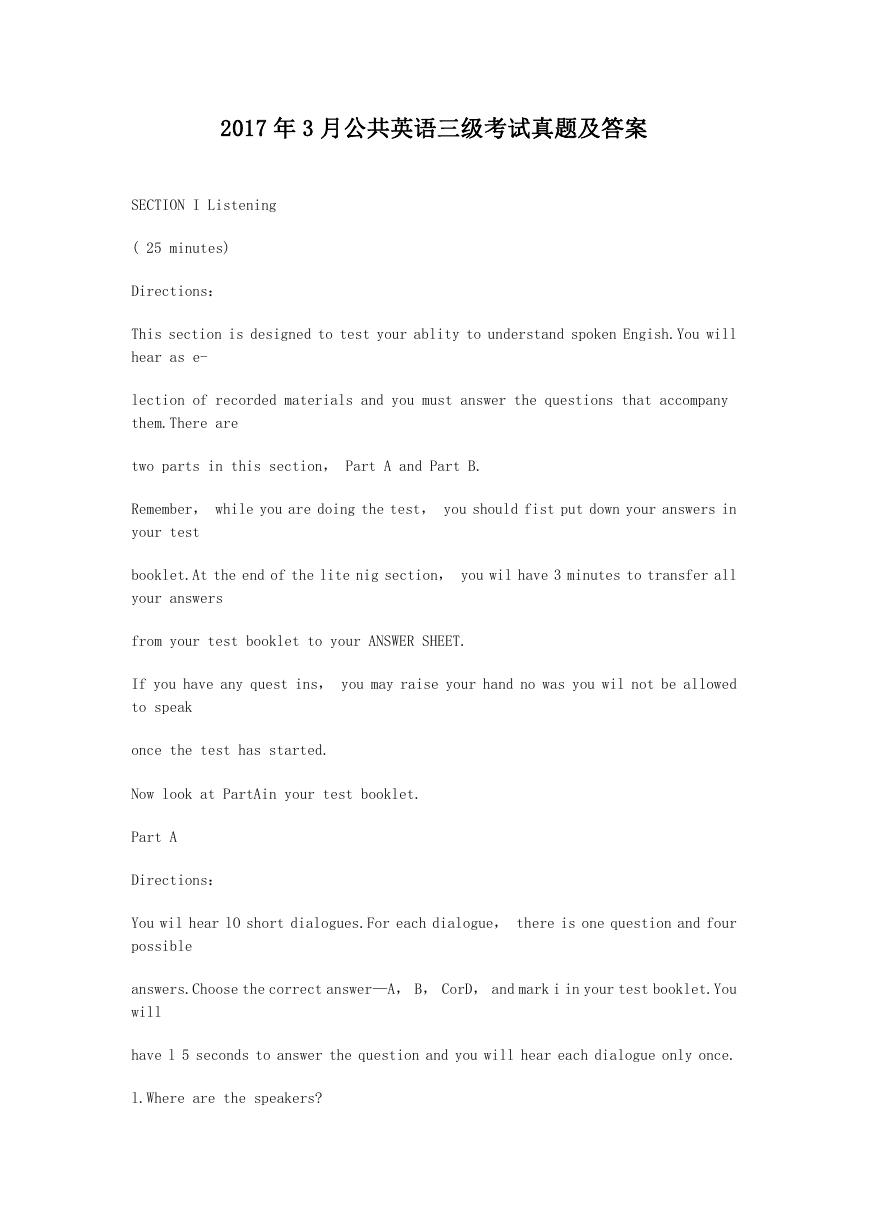
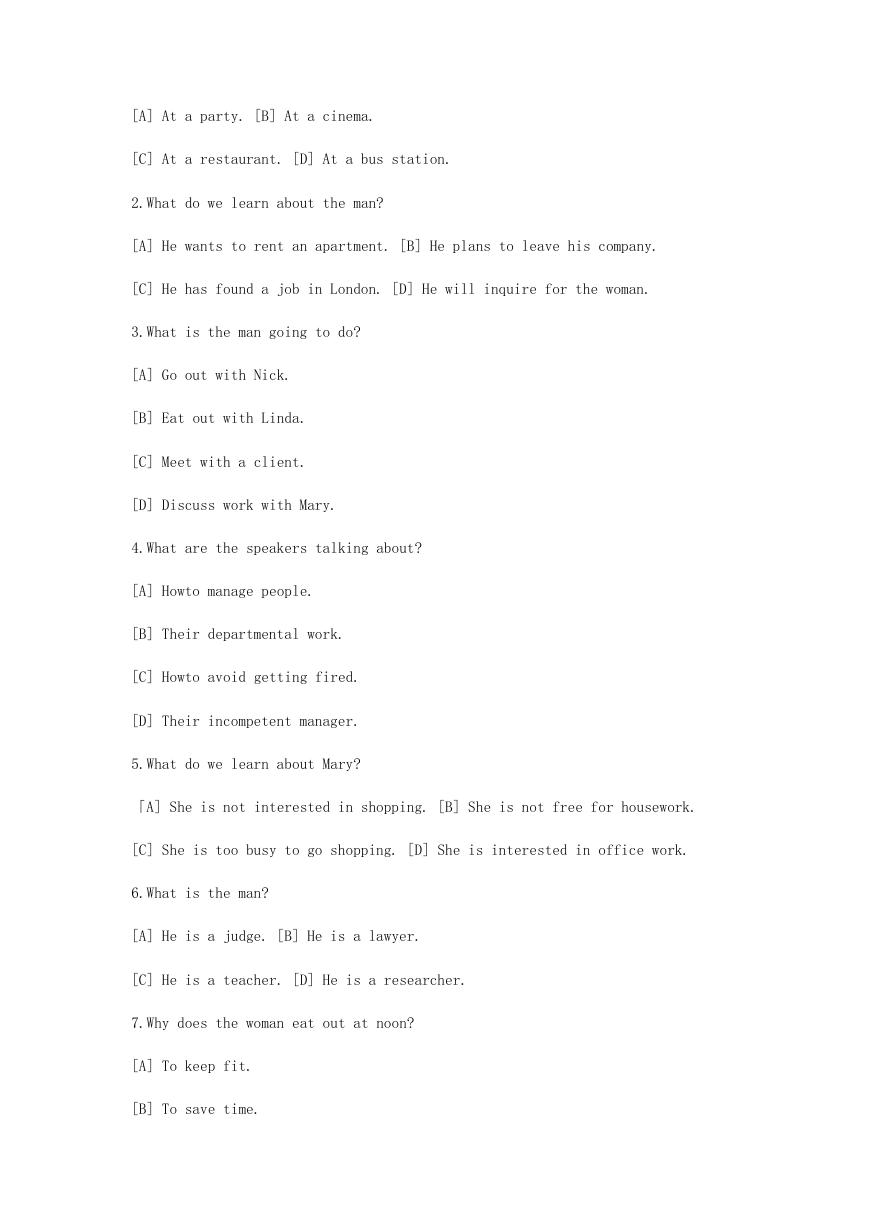

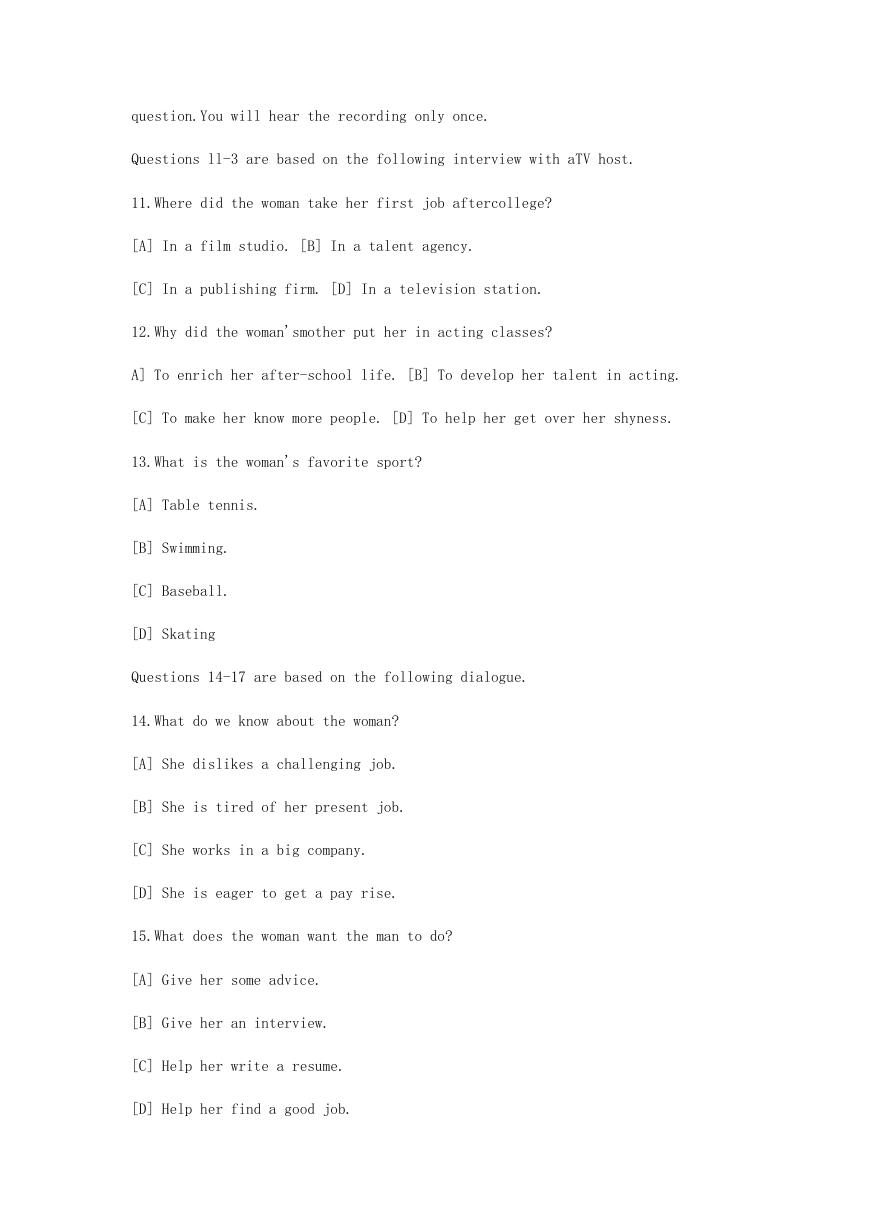

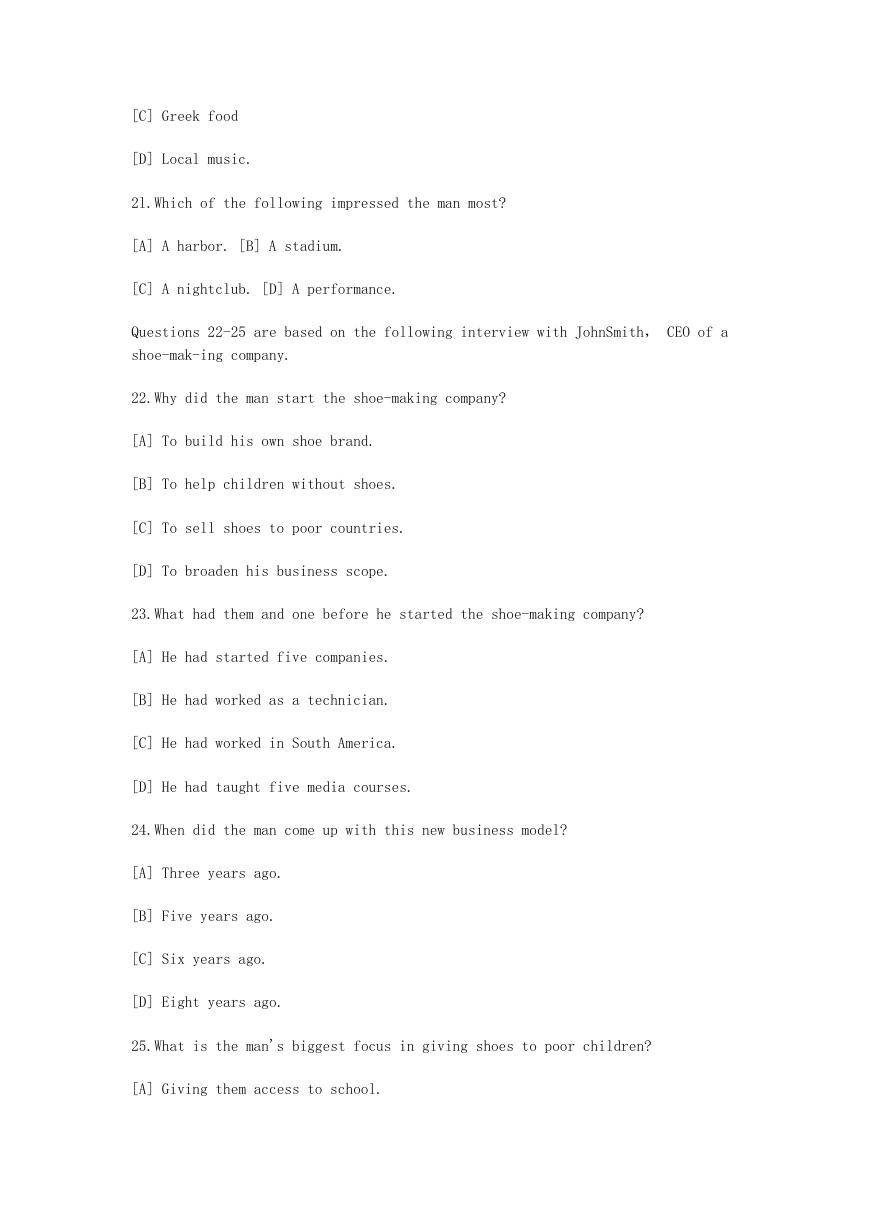
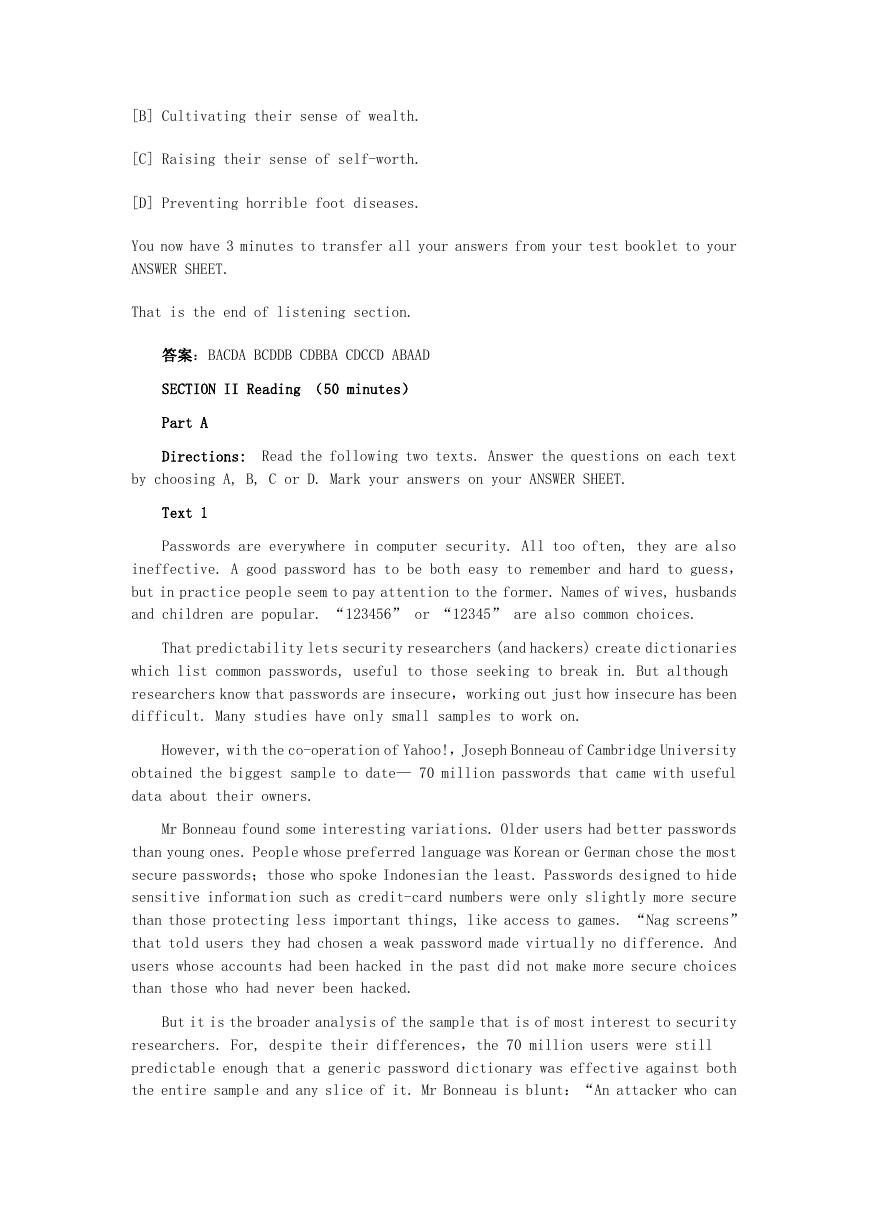
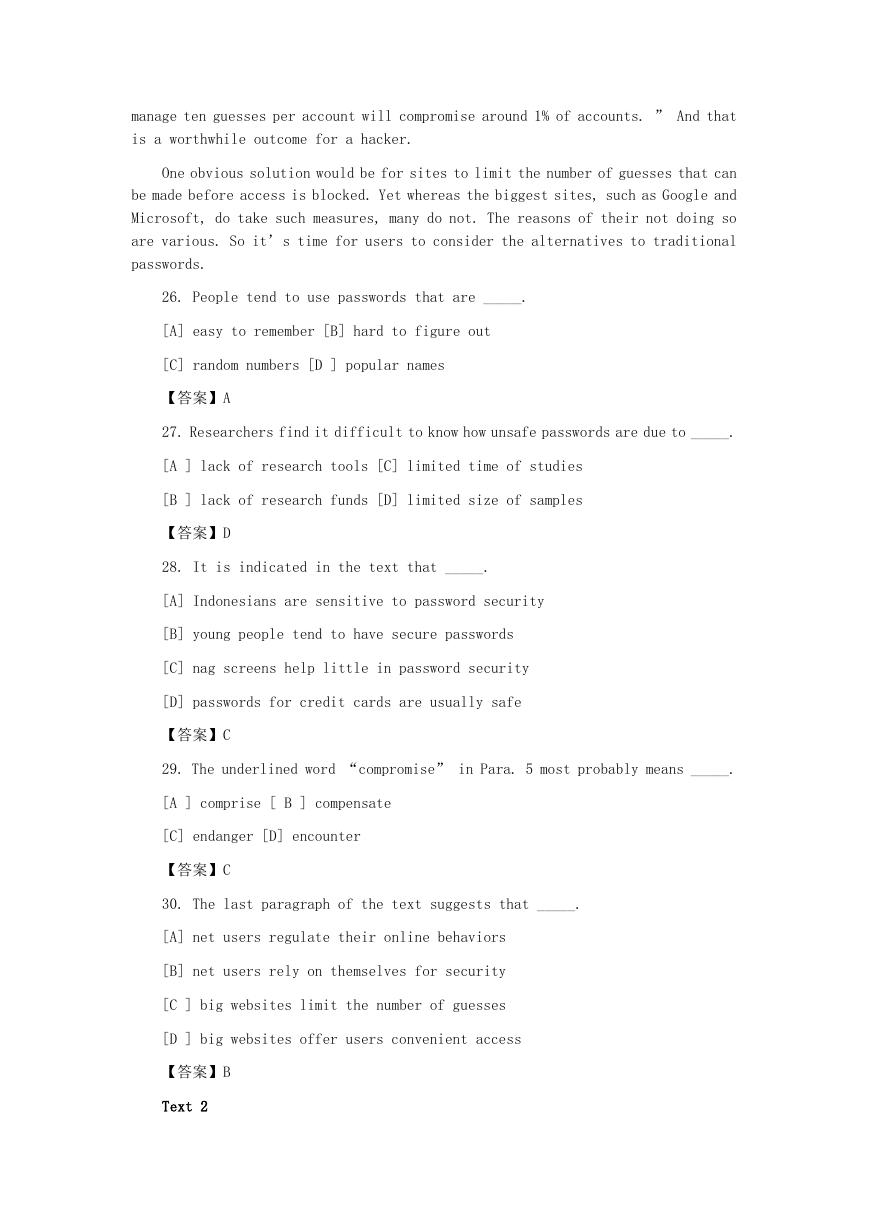








 2023年江西萍乡中考道德与法治真题及答案.doc
2023年江西萍乡中考道德与法治真题及答案.doc 2012年重庆南川中考生物真题及答案.doc
2012年重庆南川中考生物真题及答案.doc 2013年江西师范大学地理学综合及文艺理论基础考研真题.doc
2013年江西师范大学地理学综合及文艺理论基础考研真题.doc 2020年四川甘孜小升初语文真题及答案I卷.doc
2020年四川甘孜小升初语文真题及答案I卷.doc 2020年注册岩土工程师专业基础考试真题及答案.doc
2020年注册岩土工程师专业基础考试真题及答案.doc 2023-2024学年福建省厦门市九年级上学期数学月考试题及答案.doc
2023-2024学年福建省厦门市九年级上学期数学月考试题及答案.doc 2021-2022学年辽宁省沈阳市大东区九年级上学期语文期末试题及答案.doc
2021-2022学年辽宁省沈阳市大东区九年级上学期语文期末试题及答案.doc 2022-2023学年北京东城区初三第一学期物理期末试卷及答案.doc
2022-2023学年北京东城区初三第一学期物理期末试卷及答案.doc 2018上半年江西教师资格初中地理学科知识与教学能力真题及答案.doc
2018上半年江西教师资格初中地理学科知识与教学能力真题及答案.doc 2012年河北国家公务员申论考试真题及答案-省级.doc
2012年河北国家公务员申论考试真题及答案-省级.doc 2020-2021学年江苏省扬州市江都区邵樊片九年级上学期数学第一次质量检测试题及答案.doc
2020-2021学年江苏省扬州市江都区邵樊片九年级上学期数学第一次质量检测试题及答案.doc 2022下半年黑龙江教师资格证中学综合素质真题及答案.doc
2022下半年黑龙江教师资格证中学综合素质真题及答案.doc